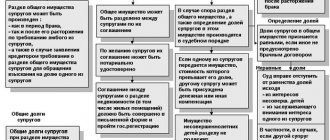NTVP "Kedr - Consultant"
LLC "NTVP "Kedr - Consultant" » Services » Legal consultations » Housing: purchase and sale, maintenance, payment » How to deregister citizens who have lost the right to use an apartment on the basis of an apartment purchase and sale agreement that has entered into force
05.10.2015 applicant O.S. purchased an apartment (certificate of state registration of rights No. ...). The apartment was purchased on the basis of a purchase and sale agreement between O.S. and citizen P.L. from 05.10.2015
At the time of the conclusion of the agreement, the defendants, members of P.L.’s family, were registered in the apartment, but did not actually live. – S.S. (daughter-in-law) and V.S. (minor daughter).
Clause 12 of the purchase and sale agreement stipulates that these persons do not retain the right to use this apartment and undertake to deregister within 30 days from the date of signing the agreement, that is, until November 4, 2015.
Despite the applicant's demands, S.S. refused to deregister and deregister her daughter.
Question.
How to remove from the register those who have lost the right to use the apartment S.S. and V.S.?
Lawyer's answer.
During the consultation, the following circumstances were clarified and confirmed by documents. Apartment seller P.L. I inherited this apartment. When P.L. and S.S. moved in and V.S., and whether the privatization of the apartment took place, the applicant does not know. At this time, the applicant and his common-law wife live in the apartment. Former residents of S.S. and V.S. lived with the previous owner, but did not pay rent for the apartment, then moved out, at the time of O.S.’s move-in. the apartment was empty, no one lived in it and there were no belongings. After entering O.S. did not provide an apartment for S.S. to live in. and V.S., they do not participate in paying for utilities, and this can be confirmed by a witness, the mother of my common-law wife K.L.
The applicant was explained his right to apply to the court to demand recognition of S.S. and V.S. who did not acquire the right to use this apartment, a draft statement of claim was drawn up, and it was explained which documents should be attached to the statement. It is explained that the amount of the state duty for cases of this category is 300 rubles, and details for paying the state duty are provided.
The statement of claim is motivated by the following arguments.
Housing rights and obligations arise from the grounds provided for in Article 10 of the Housing Code of the Russian Federation.
According to Part 1 of Art. 30 of the Housing Code of the Russian Federation, the owner of a residential premises exercises the rights of ownership, use and disposal of residential premises belonging to him by right of ownership in accordance with its purpose and the limits of its use, which are established by this Code.
According to Part 1 of Article 35 of the Housing Code of the Russian Federation, if a citizen’s right to use residential premises is terminated on the grounds provided for by this Code, other federal laws, an agreement, or on the basis of a court decision, this citizen is obliged to vacate the corresponding residential premises (stop using it). If this citizen does not vacate the said residential premises within the time period established by the owner of the relevant residential premises, he is subject to eviction at the request of the owner based on a court decision.
According to Part 2 of Article 292 of the Civil Code of the Russian Federation, the transfer of ownership of a residential building or apartment to another person is the basis for termination of the right to use residential premises by family members of the previous owner, unless otherwise provided by law.
The defendants were moved in by the previous owner, the exact period of their residence is unknown to the applicant, but at the time of the sale of the apartment they moved out of it, there are no belongings in the apartment. The defendants do not contribute to utility costs.
The applicant needs an apartment to accommodate him and his family members. The registration of the respondents violates the applicant's rights to unhindered use of this apartment.
With the transfer of ownership, the defendants lost the right to use the disputed apartment. There was no agreement between the plaintiff and defendants granting them the right to use this residential premises. There are also no other grounds established by law for retaining their right to use the apartment.
By virtue of Article 2 of the Law of the Russian Federation of June 25, 1993 N 5242-1 “On the right of citizens of the Russian Federation to freedom of movement, choice of place of stay and residence within the Russian Federation,” registration records must reflect the fact of residence or stay of citizens at the specified address.
Since the defendants have lost the right to use the apartment and do not actually live at the specified address, they are subject to deregistration at the specified address.
Based on the above, demands were made for the recognition of S.S. and V.S. who have lost the right to use the apartment at the address (...) and deregister them, and collect legal costs. A petition was filed to question K.L. as a witness.
The applicant was explained that the amount of the state fee for claims of this category is 300 rubles and details for payment were provided (the automatic generation of a receipt on the website of the Industrial Court did not work at the time of receipt).
Zhidkova Ekaterina Nikolaevna, lawyer, professional mediator, tel. 8-912-755-68-43, mail
The consultation was given in November 2015 as part of the “Professional Lawyer 2015” competition
Extract from the apartment upon sale
The condition for the sale of an apartment is usually its complete release from the persons who previously lived in it. To do this, it is necessary that their registration at the place of residence in the housing being sold be terminated. Let's take a closer look at when and how it is necessary to ensure an extract from an apartment when selling it.
Before or after the deal
The safest option for the buyer is to register all persons living in the apartment before concluding the transaction and transferring money to the seller. In this case, the purchase and sale agreement is concluded only after:
- The seller ensured that the registration of all persons living in the apartment was terminated;
- The buyer was provided with documents confirming the absence of registered persons in the apartment.
The owner (seller) can obtain a certificate confirming the absence of persons registered in the apartment at the move-in department (passport office) at the location of the property. It is also possible to obtain this document through government services.
However, discharge of all residents “in advance” is not always possible. This method will not work in the case of a chain of transactions when the seller simultaneously buys another apartment where he and his family members will move. In this case, the extract of registered persons will have to be completed after the conclusion of the purchase and sale agreement. However, this option does not provide complete security to the buyer.
How to formalize it in a contract
If all residents have checked out of the apartment before the transaction, the seller does not need to take any additional actions. But it is advisable to include in the contract a guarantee that no one is registered in the residential premises. An example of such a clause is given below:
If registered residents are discharged after the purchase and sale agreement is concluded, it must include the seller's obligation to ensure their departure from the apartment.
The registration of persons registered in the apartment may be considered as a condition for full payment of the price under the contract. In this case, part of the price is deposited in a safe deposit box or in a separate letter of credit, the condition for the disclosure of which will be the provision of a document confirming the absence of resident (registered) persons.
Such conditions can be formulated as follows:
In addition to these conditions, it is necessary to provide other measures to protect the interests of the buyer, in particular, to ensure the return of funds paid or their retention until the issue of termination of registration is resolved. Therefore, any such agreement must be shown to a lawyer involved in real estate transactions.
How long does it take
Termination of registration at the place of residence (extract from the apartment) is carried out on a voluntary basis at the request of residents within a period of 3 to 7 days.
Consult a lawyer and find out how to act correctly in your situation
Moscow, Moscow region ext. 226
St. Petersburg, Leningrad region: 8 (812) 309-06-71 ext. 780
Federal number ext. 764
In the event of a conflict, this period may be delayed during court proceedings to evict the persons living in the apartment. Therefore, in such cases, it makes sense for the buyer to abandon the transaction and find another home without such problems.
If a child lives
Discharge of a child from an apartment is carried out according to the same rules as the discharge of an adult. The only difference is that the child must be registered at the place of residence with one of his legal representatives. Therefore, termination of registration of a child and his parent must be carried out simultaneously.
https://www.youtube.com/watch?v=Zw8JvuM4A8I
If the child is not the owner of a share in real estate, the consent of the guardianship and trusteeship authority to terminate its registration is not required. The exception is cases when a minor is discharged from a non-privatized apartment.
Without checking out residents
Selling an apartment without deregistering the persons living in it is also possible. But such housing is priced at a significant discount.
If any of the registered persons previously issued a refusal of privatization, he retains the right to reside in this residential premises for life. This right can only be waived on a voluntary basis. Forced discharge of a “refusenik” is impossible.
Retention of residence may also occur for other reasons. Such transactions are allowed, but only if the buyer agrees to receive residential premises with a similar encumbrance.
According to Art. 558 of the Civil Code of the Russian Federation, the list of persons who, in accordance with the law, retain the right to use residential premises after a change in its owner, is an essential condition of the purchase and sale agreement.
Such a list should include:
- Full name of these persons;
- Description of their rights to use the apartment, indicating the grounds.
What to do if the statement fails
The buyer's course of action in this case depends on what is specified in the purchase and sale agreement.
Depending on its content, the scope of possibilities may be different - withhold part of the price of the apartment until the issue is resolved, file a lawsuit to evict the previous residents, completely terminate the contract and return the money paid, or other options for resolving the situation.
Therefore, if problems arise when concluding a purchase and sale agreement with the release of residents, you should immediately consult with a lawyer. and get an exact answer to it.
Consult a lawyer and find out how to act correctly in your situation
Moscow, Moscow region ext. 226
St. Petersburg, Leningrad region: 8 (812) 309-06-71 ext. 780
Federal number ext. 764
Source: https://fz214fz.ru/dolshiku/vypiska-iz-kvartiry-pri-ee-prodazhe
Applications, consents, refusals
Marital Status Statements:
- passport,
- when alienating a piece of real estate: you need to know what is being alienated and at what address it is located
- upon alienation of a share of the authorized capital (name and address of the legal entity, TIN, OGRN, size of the share in the authorized capital)
Application for acceptance of inheritance:
- you will need to provide a passport,
- know the name of the deceased, date of death, place of registration at the time of death,
- know what is included in the inheritance property,
- Full name of other heirs.
Application for renunciation of citizenship of another state and adoption of Russian citizenship:
- passport, passport translation, residence permit.
Application for consent to temporary registration and residence in residential premises for minor children:
- you will need a passport,
- birth certificate,
- know the registration address at the place of residence in the residential premises.
Application for deregistration and registration at a new address:
- you must provide a passport,
- know the registration address of your new place of residence.
Application for issuance of a duplicate document from the archives of a notary office:
- passport.
OBLIGATIONS
By virtue of an obligation , one person (debtor) is obliged to perform a certain action in favor of another person (creditor), such as: transfer property, perform work, provide a service, contribute to a joint activity, pay money, etc., or refrain from a certain actions, and the creditor has the right to demand that the debtor fulfill his obligation. – see 307 Civil Code
Wherein:
- the scope of the obligation must always be precise and not subject to the discretion of the debtor
- the debtor's actions must be possible by nature
- actions must be possible based on the requirements of the law and not contradict morality
- the debtor's action must be based on the interest of the creditor (trustee)
- when establishing, fulfilling an obligation and after its termination, the parties are obliged to act in good faith, taking into account the rights and legitimate interests of each other,
- the parties to the obligation must mutually provide the necessary assistance to achieve the purpose of the obligation,
- The parties to the obligation must provide each other with the necessary information.
Arise from:
- agreements - for example, from a loan agreement an obligation to repay the loan arises (you will find more information about agreements in the corresponding section of our website)
- other transactions - such as: an obligation to register residential premises acquired with the use of maternal (family) capital as common property, an obligation to deregister at the place of residence, an obligation to alienate residential premises to a minor, etc.
- due to harm
- due to unjust enrichment
- from other grounds: from acts of state bodies and local governments, which are provided by law as the basis for the emergence of civil rights and obligations, from a court decision establishing civil rights and obligations, etc.
Let us take a closer look at the obligations for which notary offices are most often approached.
OBLIGATION “ON MATERIAL CAPITAL”
We are talking about the obligation of the person (persons) in whose ownership the residential premises are registered, acquired in one way or another using funds (part of the funds) of maternal (family) capital, to register the specified residential premises in the common ownership of the person who received the certificate, his spouse, children ( including the first, second, third child and subsequent children) with the determination of the size of shares by agreement, in the event that the residential premises have not already been registered as the common property of family members or state registration of ownership of the residential premises has not been carried out.
This document is subject to mandatory notarization and is one of the most important in the list of documents submitted to the Pension Fund.
List of BASIC documents for formalizing the obligation “for maternity capital”:
- passport/s of the person/s on whose behalf the obligation is being drawn up
- marriage certificate - if the obligation is drawn up from both spouses-parents
- state certificate for maternity (family) capital
- information (in any form) about the purposes for which maternity (family) capital will be used.
To formalize other obligations, you must have a passport.
FULL LIST of documents required to formalize the obligation “for maternity capital” with the specifics of your case. You can find out in person by making an appointment for a consultation.





